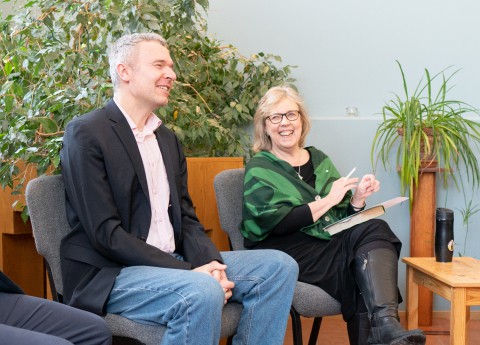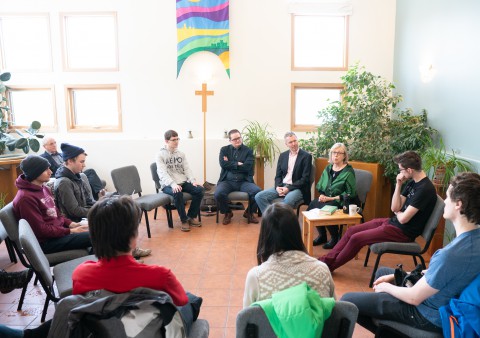
A group of students, University of Saskatchewan staff and passersby had the chance for an intimate conversation about faith, the environment and doing our part to combat climate change with federal Green Party Leader Elizabeth May at the Lutheran Campus Ministry on March 11.
May made the appearance as a side stop on her crosscountry Community Matters Tour. In addition to stopping by campus, May also held a townhall at the Francis Morrison Central Library later that evening.
Unlike the typical gauntlet of questions and answers at a townhall meeting, May instead led a conversation on the relationship between the environment and how Judeo-Christians interact with it and then answered some pertinent questions.
May, a long-time practitioner of the Anglican faith, says that, although secular as a whole, consumerism is Canada’s state religion and that it has characterized the country’s trajectory.
“I do think we are a secular society. We do have a state religion — it comes with its own rituals, liturgy, catechism and practice, and it is that we worship the economy. That is the dominate state religion. Its central tenets are selfish individualism. This will lead straight to doom. In politics, you can’t present an argument on moral grounds but that the economics add up in a certain way.”
May also states that, in addition to adopting perspectives on the environment similar to those of Canada’s Indigenous peoples, even provinces resistant to climate plans, like Saskatchewan, can lead the country’s climate efforts.
“In Canada, Saskatchewan gave the entire country universal health care because Tommy Douglas was so brave,” May said. “There are conservatives in government, but it [is] still a population of people that are largely connected to land [with] more people dependent on land than in cities… In the context of getting away from fossil fuels, this connectedness has to come back.”

In January, the Sheaf determined that the U of S is still uncertain about how it will be dealing with the financial burden of the federal carbon tax. When asked how postsecondary institutions should be charged for their carbon emissions, May says that students should not be the ones to pay. May also says that, if the U of S is sincere about wanting to be a climate leader, the university administration needs to make demands of the federal government.
“The ideal scenario is that the university says to the federal government, ‘Where is our program for eco energy retrofits? We need more efficient furnaces and insulation. We want solar panels. We want this university to be a net-zero contributor. We want to actually create more energy than we use,’” May said. “The way the campus is situated, you could be generating energy from solar, wind and geothermal.”
—
Tanner Bayne / News Editor
All Photos: Riley Deacon / Photo Editor
Leave a Reply